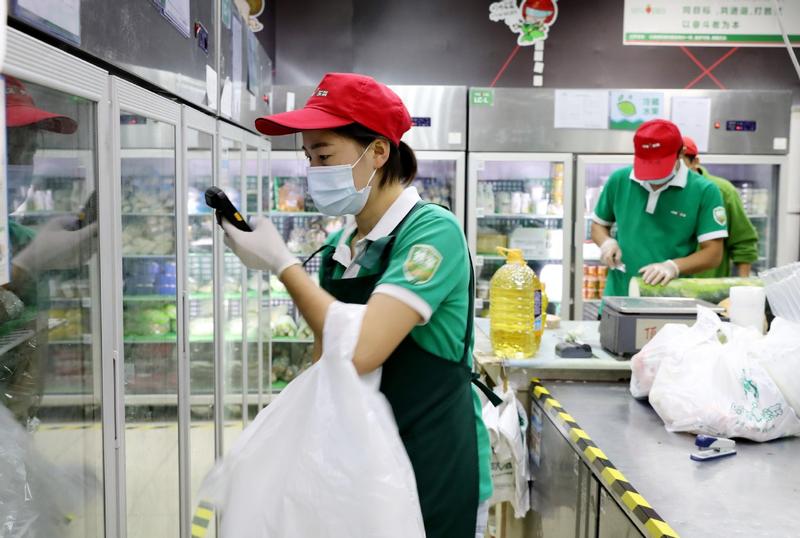 In this undated file photo, an employee of online grocery platform Dingdong Maicai packs vegetables in Shanghai. (PHOTO / XINHUA)
In this undated file photo, an employee of online grocery platform Dingdong Maicai packs vegetables in Shanghai. (PHOTO / XINHUA)
Chinese online grocery platform Dingdong Maicai has raised US$700 million in its latest round of financing from a group of investors, further raising the stakes in the country's online grocery sector, which has seen diversified development despite the COVID-19 pandemic.
Led by DST Global and Coatue, the new fundraising attracted over 15 investors, including Tiger Global Management, General Atlantic, CMC Capital, Sequoia Capital China and Cygnus Equity, the company said.
Founded in 2017, the Shanghai-based e-grocery currently has a presence in 29 cities across the nation. The company said it will use the funds to expand into new areas and improve supply chains.
"It is time for Dingdong Maicai to raise more money to support its business expansion in the country's highly competitive online grocery sector," said Kong Rong, chief analyst at TF Securities.
More importantly, Dingdong Maicai and (its competitor) Miss Fresh-which take front-end warehouses as focus-are facing fierce competition from community group-buying platforms.
Kong Rong, chief analyst at TF Securities
Kong said that competitors like Miss Fresh are already vying to be the first listed online grocery company. Miss Fresh had in July raised US$495 million and announced its listing intentions.
"More importantly, Dingdong Maicai and Miss Fresh-which take front-end warehouses as focus-are facing fierce competition from community group-buying platforms," Kong said. Front-end warehouses refer to small stations located close to shoppers' communities and neighborhoods, which make order deliveries in 30 minutes possible.
Unlike the front-end warehouses, community group-buying is another hot spot of the online grocery sector, where a team of consumers buy goods or services together online at comparatively lower prices.
ALSO READ: Group-buying faces challenges, market snub
"To establish front-end warehouse costs a lot, but group-buying business models are able to generate steady cash flows. This is also why tech giants are looking to enter the group-buying industry," said Wang Peng, an associate professor at the Hillhouse Research Institute of the Renmin University of China in Beijing.
Online delivery firm Meituan and e-commerce platform Pinduoduo, which were among the earliest to launch community group-buying services, are currently leading the pack. E-commerce giant JD announced its entry into the sector in December, which according to its CEO Richard Liu, is a "new business segment" to penetrate into lower-tier cities.
The online group-buying business has fully met the untapped potential of price-sensitive consumers, which totally transformed and innovated the traditional consumption model, said Jing Linbo, head of Evaluation Studies of the Chinese Academy of Social Sciences, a think tank.
"The traditional small-batch/large-scale production model, which was centered on manufacturers, is becoming more consumer-centric. This personalized customization mode is expected to stimulate the vitality of social productivity and improve business efficiency," Jing said.
Jing said that for consumers, "price" is the first and most important factor prompting them to buy things together with friends or strangers online. It is also the driving factor that propels consumption.
READ MORE: Cross-border e-commerce pilot zones to be expanded nationwide
However, the country's market regulator fined five community group-buying platforms last month for improper pricing. The platforms were owned and backed by Meituan, Pinduoduo, Tencent Holdings, Alibaba Group and Didi Chuxing.


